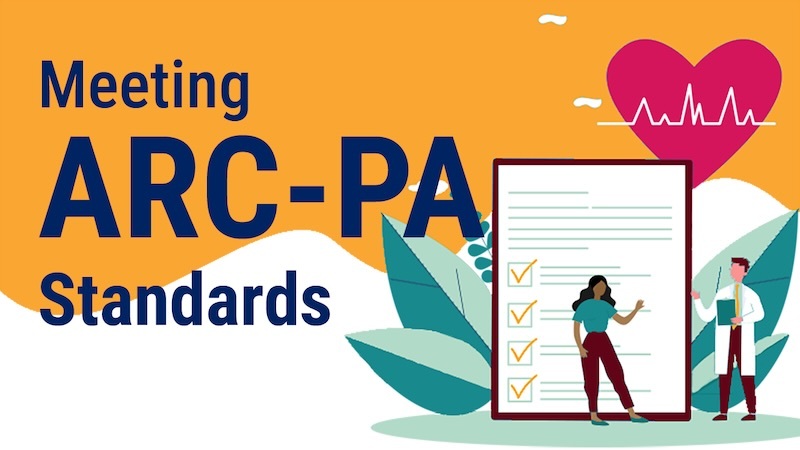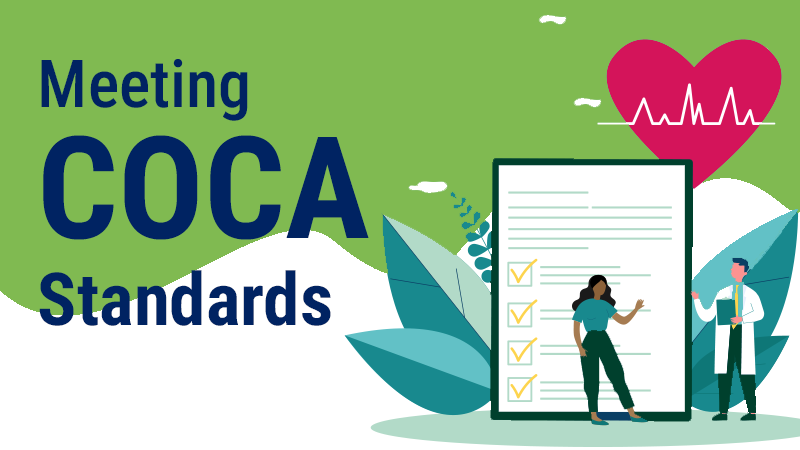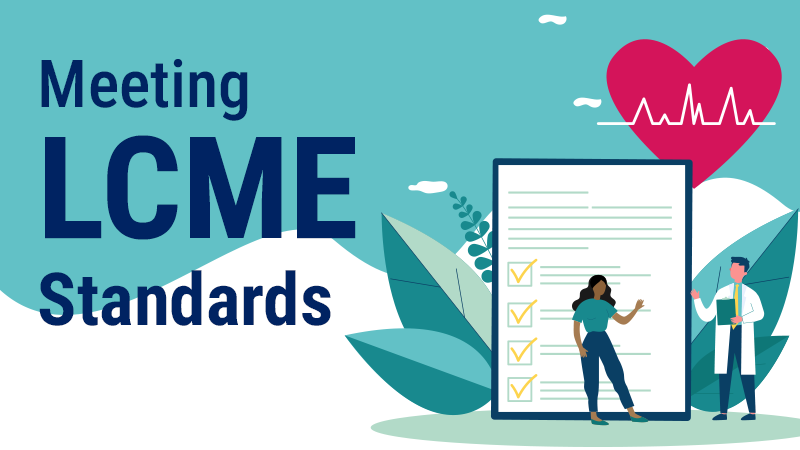The Killer B’s
Meeting the requirements for accreditation is an ongoing challenge for physician assistant programs. The program curriculum must prepare students to provide patient-centered care and to work collaboratively on interprofessional teams. Not only must the curriculum include applied medical, behavioral, and social sciences; health policy and professional practice issues; patient assessment and clinical medicine; and supervised clinical practice – it also requires a strong foundation in evidence-based medicine and health information technology.
PA curriculum must be consistent with program competencies and enable all students to meet the program’s learning outcomes. In doing all of this, PA curricula must place a heavy emphasis on the need to remain current in the face of an ever-changing clinical environment.
Currently serving 90 physician assistant programs (and 96% of U.S. allopathic medical schools), Aquifer is a trusted tool in health professions education. Aquifer’s teaching and learning tools can help programs of all shapes and sizes meet many of the ARC-PA Standards.
Section B: Curriculum and Instruction
B3 Supervised Clinical Practice Experience Instruction
B3.03, B3.04, B3.07 Variety in SCPE’s
- B3.03 Supervised clinical practice experiences must enable all students to meet the program’s learning outcomes for care across the lifespan, and for different types of patient care and healthcare services
- B3.04 Supervised clinical practice experiences must occur in a variety of clinical settings.
- B3.07 Supervised clinical practice experiences must occur with preceptors who enable students to meet program-defined learning outcomes for a variety of medical disciplines.
How Aquifer Helps
Enhancing the Range of Clinical Encounters
The expectation by ARC-PA is that supervised clinical practice experiences (SCPEs) include direct patient care, meet the program-defined learning outcomes, and be of sufficient breadth and depth to prepare students for the clinical practice of medicine. In addition to caring for patients, PA programs may be able to use virtual experiences, simulation, or other technology to meet some of the program-defined learning outcomes for SCPEs¹.
Aquifer courses and cases can be integrated into the clinical experience to enhance and supplement the student’s bedside experience. Content is derived from the core curriculum of Aquifer’s collaborating national medical educational organizations. Every Aquifer course contains cases that explore the diagnosis and treatment of common acute and chronic illnesses as well as health maintenance visits.
Cases are developed and maintained by teams of leading medical educators who collaborate with their national education organizations to build courses that are evidence-based and that model realistic clinical experiences, preceptor interactions, and teaching. Engaged in continuous practice of their clinical reasoning skills, students move through the stages of a patient’s presentation, assuming the role of a virtual student working with a preceptor—from eliciting the chief complaint to taking a history, performing a physical exam, composing an assessment, formulating a differential diagnosis, and on to diagnostic testing and management. Cases include results of diagnostic testing, videos, audio, and images to support a complete patient encounter.
There are numerous ways to classify the spectrum of patients to be seen. With the Aquifer Content Library, it’s easy to search cases to find the content you need and assign it to students.
For example, filters can cover:
- Ages/developmental stages
- Types of illnesses
- Systems-based categories
- Clinical discipline
- Clinical setting

Suggested methods for assigning cases include:
- Assign strategically selected cases at the beginning of the rotation to:
- prepare students to see patients with conditions they are likely to encounter
- fill known clinical gaps
- Assign cases individually throughout the clerkship, based on a review of each student’s clinical logs.
- A combination of both.
Documentation Method
Aquifer automatically creates a log of students’ completion of virtual patient cases. The Student Report, only accessible to people with specific administrative privileges in Aquifer’s platform, shows the detailed progress of an individual student in each case in a course, including:
- The cases the student has completed, partially completed, or not yet not begun
- Time from case start to completion
- Additional details on the date the case was started, completed, and last accessed
- Summary Statements submitted by students for cases that require them
(1) ARC-PA Accreditation Manual for Entry Level Physician Assistant Program 2022 Accreditation Standards for PA Education 5th edition.
B1 Curriculum
B1.01c & B2.02 Clinical Application of Basic Science
- B1.01c The curriculum must include core knowledge about established and evolving biomedical and clinical sciences and the application of this knowledge to patient care.
- B2.02 The curriculum must include instruction in the basic medical sciences and their application in clinical practice.
How Aquifer Helps
Integrated Illness Scripts are designed specifically to promote cognitive integration and provide a framework for learners to link basic science and clinical knowledge. Building on the traditional illness script format, Integrated Illness Scripts (IIS) embed basic science core concepts and causal mechanisms within each clinical feature and display the connections visually through Mechanism of Disease Maps. A variety of rich, fully-developed active learning sessions are available to accompany Integrated Illness Scripts to extend the learning to case-based learning or other didactic sessions.
Ready-to-use IIS Activity Cards provide simple ways to use Integrated Illness Scripts (IIS) to help students link basic science and clinical knowledge for better, safer clinical decisions. Based on proven learning theory, ready-made Activity Cards are quick and easy to drop into your classroom session or to drive discussion in clinic. Activities range from 5 minutes to 30 minutes long with many activities including handouts like fillable Mechanism of Disease Maps. IIS Activity Cards can be assigned to students as pre-work or they can be used in class or clinic.
The Aquifer Sciences Curriculum is the first nationally-developed and publicly available curriculum that comprehensively outlines the core basic sciences concepts that must be understood and mastered by health professions learners in order to provide safe, routine patient care. The curriculum is freely available and provides an ideal tool for those undergoing curricular planning.
B1.04 Equivalent Access to Learning
- B1.04a, b The program must ensure educational equivalency of course content, student experience and access to didactic and laboratory materials when instruction is conducted at geographically separate locations, and/or provided by different pedagogical and instructional methods or techniques for some students.
How Aquifer Helps
Aquifer cases provide comparable learning experiences across training sites, at various times of year, and when didactic instruction is conducted at geographically separate locations. This allows for educational equivalency of didactic course content and standardization of the availability of patients and key conditions in supervised clinical practice experiences (SCPEs). Because the cases are available both online and offline via our iOS and Android apps, students have access to them from all didactic geographic locations, training sites, facilitating student placement in rural and community settings as well as other distance settings.
B2 Didactic Instruction
B2.03 & B2.08 Covering the Lifespan & All Organ Systems
- B2.03 The curriculum must include instruction in clinical medicine covering all organ systems.
- B2.08 The curriculum must include instruction in the provision of medical care across the life span and in a variety of clinical settings.
How Aquifer Helps
Aquifer courses provide practice with virtual patients at all stages, from birth, through childhood and adulthood, to end of life. With courses in Pediatrics, Family Medicine, Internal Medicine, Geriatrics, Radiology, Trauma-Infomed Care, and Palliative Care, Aquifer covers the full continuum of care. Additionally, interdisciplinary courses in Diagnostic Excellence (medical errors), Telemedicine, High Value Care, Medical Home, and Social Determinants of Health are also available to support your curricular needs.
Several virtual patient cases address wellness and preventive care (including Family Medicine Cases 1&2, Pediatrics Cases 2, 3, 4, 5 & 6, Internal Medicine Cases 13,14), and Geriatrics Case 13 ). Other cases provide students the opportunity to practice clinical reasoning for common medical conditions, including interpreting abnormal clinical findings, developing differential diagnoses, selecting appropriate diagnostic tests, and developing treatment plans.
Rather than providing rote, depersonalized clinical data, Aquifer virtual patients are deliberately designed to illustrate a variety of socioeconomic backgrounds in order to teach students how biopsychosocial factors interact to impact patients’ health.
Foundational skills in communication, symptom management, transitions of care, and interprofessional collaborations are critical in improving the quality of life of patients with serious illnesses–but most health professions students don’t receive standardized education in these key principles of primary palliative care. Aquifer Excellence in Palliative Care can be used to help prepare learners to provide high-quality patient-centered care.
The searchable content library allows faculty to filter by organ system, patient age, condition, and more to easily find the cases or Integrated Illness Scripts they need to fit their curriculum.
B2.04 Communication Skills
- B2.04 The curriculum must include instruction in interpersonal and communication skills that result in the effective exchange of information and collaboration with patients, their families and other health professionals.
How Aquifer Helps
There are a wide variety of rich tools to support educators and students in this area. All Aquifer cases model communication between students, patients, preceptors, and other members of the care team.
The four modules in Aquifer Oral Presentation Skills teach the focused, problem-based inpatient case presentation given on work rounds, where a premium is placed on brevity and clinical decision-making. Modules have been proven to be as effective as in-person teaching.
Aquifer cases can also act as a standardized patient activity. Since faculty can easily view the details of the case, rich feedback can be provided on presentations to develop skills in students.
- Write SOAP notes (Podcast with more details)
- Practicing handoffs
- Present a case as if on rounds
Most Aquifer cases include the opportunity for students to write a summary statement, which can be viewed by faculty and compared to the expert answer in the reports.
There are several cases that specifically focus on communicating with patients and their families around serious illness:
- Advance care planning (Geriatrics 27 & Excellence in Palliative Care 4)
- Family meetings (Excellence in Palliative Care 3)
B2.05 Clinical Reasoning
- B2.05 The curriculum must include instruction related to the development of clinical reasoning and problem-solving abilities.
How Aquifer Helps
Aquifer patient cases are evidence-based, include references to supporting literature, and are peer-reviewed. They provide students multiple opportunities to practice evidence-based clinical problem-solving through embedded questions and receive expert feedback on their work through answer comments and teaching points. In most cases, students practice differential diagnoses, critical thinking, and evidence appraisal. Many cases require students to synthesize the information and write a summary statement.
In many Aquifer Family Medicine, Internal Medicine, and Pediatrics cases, students are asked to write out a one to three sentence summary statement that mimics the communication skills they need on rounds, calling consults, and writing patient progress notes. Writing a summary statement requires the synthesis of complex patient information, pushing the student to determine what pieces of information are important to create a differential diagnosis. This process acts as a surrogate for clinical reasoning skills, and a review of this work can be a window into the development of these skills and a useful tool for discussion and delivery of formative feedback.
Additional teaching tools, designed to accompany the cases, can enhance these skills as well, including:
- Case Analysis Tool (a structured worksheet to be completed by the student as they work through an Aquifer case, allowing faculty to provide feedback on clinical reasoning skills).
- Other active learning sessions created to accompany Aquifer cases and further support this aspect of critical judgment.
B2.06 Diverse Patient Populations & Social Determinants of Health
- B2.06 The curriculum must include instruction to prepare students to provide medical care to diverse populations of patients with consideration for the social determinants of health.
How Aquifer Helps
Following a thorough review of all existing Aquifer cases according to our peer-reviewed and published criteria (Academic Medicine), our cases continue to be regularly reviewed based on these principles by teams of medical educators to ensure that current best practices are consistently integrated across our content library.
Aquifer’s three Social Determinants of Health Cases and accompanying active learning modules build a foundational understanding of SDOH and teach evidence-based strategies to help improve health outcomes and equity for patients. The overview and resources module provides an understanding of how cultural beliefs and community culture affect health outcomes and strategies for improving clinician-patient interactions. The two virtual patient cases provide an opportunity for students to learn in the context of a realistic patient scenario and practice the application of the information in a safe space, working through patient and family interactions, and practice using the tools when caring for a patient.
Aquifer Diagnostic Excellence cases include teaching on cognitive bias, with supporting active learning sessions to drive discussions and enhance learning through sharing experiences.
B2.07 Patient evaluation, diagnosis & management across all age groups
- B2.07 The curriculum must include instruction in patient evaluation, diagnosis and management across all age groups and from initial presentation through ongoing follow-up.
How Aquifer Helps
Aquifer cases cover the full lifespan and take the time to walk learners through a complete patient encounter, from taking a history and conducting a physical exam, through diagnosis and testing, creating a management plan. Many cases include details about follow-up visits. Aquifer’s proven pedagogy walks learners through each step of the process with in-depth explanations, asking questions that require students to apply their knowledge along the way and providing detailed answer explanations.
Aquifer cases are ideal for use in the flipped classroom format. Didactic/pre-clinical students find it helpful to go through cases together in class or small groups. Cases can be used as standardized patients to build assignments to meet your objectives. Cases are also ideal springboards for discussion in small groups, PBL, or TBL sessions.
B2.10 Interprofessional teams
- B2.10 The curriculum must prepare students to work collaboratively in interprofessional patient centered teams.
How Aquifer Helps
The Aquifer Excellence in Palliative Care cases put emphasis on interprofessional care, which is clearly highlighted in Case 5: Interprofessional roles and responsibilities.
Other cases that focus heavily on this area include:
- Geriatrics 21: 70-year-old female with symptomatic end-stage COPD: An Interprofessional Case. This is designed specifically to explore interprofessional roles.
- Geriatrics 23: 70-year-old female and hazards of hospitalization: Transitions of Care and Discharge. This case focuses on planning for geriatric inpatients. It is also an excellent case for exploring the role of interprofessional teams.
B2.11 & B2.12 Social & Behavioral Sciences; Patient Counseling & Education
- B2.11 The curriculum must include instruction in the social and behavioral sciences and their application to clinical practice.
- B2.12 The curriculum must include instruction about basic counseling and patient education skills that is patient centered and culturally sensitive and focused on helping patients.
How Aquifer Helps
The Course on Addiction and Recovery Education (CARE) – distributed by Aquifer on behalf of the Hazelden Betty Ford Foundation – concentrates on critical addiction and substance use topics that medical students and healthcare professionals need to be able to address. CARE prepares students to identify, intervene, and address substance use disorders, filling a critical gap in formal education surrounding substance use disorders and addiction.
Aquifer’s Social Determinants of Health course includes teaching the core principles, as well as two application cases that cover poverty and language as social determinants of health and teach evidence-based strategies to help improve health outcomes and equity for patients.
The cases in Aquifer Trauma-Informed Care address a range of core competencies and critical learning objectives, including the prevalence and health effects of trauma, the principles of trauma-informed care, the neurobiology of trauma, clinical management of persons who have experienced traumatic events, and interprofessional collaboration methods for working with trauma-affected patients.
Aquifer Excellence in Palliative Care provides foundational knowledge and practical clinical application of the principles of palliative care that every clinician should know to improve outcomes and quality of life for seriously ill patients and their families.
A number of Aquifer Family Medicine Cases include learning objectives around adherence to treatment plans and the incorporation of appropriate psychosocial, cultural health literacy, and family data into the management plan. These include:
- Family Medicine 03: 65-year old female with insomnia
- Family Medicine 06: 57-year old female diabetes care visit
- Family Medicine 21: 12-year-old female with fever
Additional teaching that meets these Standards is also found throughout the Aquifer Signature cases.
B2.16 Preventing Medical Errors
- B2.16 The curriculum must include instruction in patient safety and prevention of medical errors.
How Aquifer Helps
The six virtual patient cases in Aquifer Diagnostic Excellence introduce students to the cognitive processes and system-related issues that can lead to errors. Cases include foundational content about diagnosis, contributing factors, and strategies to avoid errors. Causes and consequences of diagnostic errors for patients, families, and providers are discussed in detail, and students are encouraged to reflect on their own experiences. This course provides tools to help students mitigate diagnostic error.
Each of the 6 cases includes activities designed as 60-minute classroom sessions. Classroom strategies include a rich array of activities, reflection questions for discussion, worksheets, and more.
B4 Assessment of Student Learning
B4.01 The program must conduct frequent, objective and documented evaluations of student performance
- B4.01 The program must conduct frequent, objective and documented evaluations of student performance in meeting the program’s learning outcomes and instructional objectives for both didactic and supervised clinical practice experience components. The evaluations must align with what is expected and taught and allow the program to identify and address any student deficiencies in a timely manner.
How Aquifer Helps
Aquifer has a variety of tools that support formative feedback and allow timely identification of student deficiencies so they can be addressed. Many cases require students to write a summary statement, which is visible in faculty reports alongside an expert comment, providing an opportunity for faculty to provide feedback on developing clinical communication skills.
Aquifer’s Case Analysis Tool (CAT) is a structured worksheet to be completed by the student as they work through an Aquifer case, designed to enhance the development of clinical reasoning skills. The CAT helps students by walking them through each step of the Aquifer case and aiding in organizing their critical thinking. Using it in conjunction with Aquifer cases, helps students better explain their decision-making and learn to navigate clinical situations independently. The CAT can be used as a graded assignment, or to provide formative feedback to students.
The Aquifer Internal Medicine Clinical Decision-Making Exam (formerly the Key Features Exam) provides a unique way to assess individual students’ clinical decision-making skills. Providing individual, class and case-level performance, this exam, validated in a 2019 study published in Academic Medicine, focuses on challenging decisions in diagnosis and management to target critical decision points that students will encounter in clinical practice. The exam is designed to assess students’ ability to prioritize a differential diagnosis, select which historical, physical exam, or testing data are necessary to diagnose the problem, and identify the most appropriate management of the problem. It presents patients with undifferentiated symptoms and walks through different stages of patient care in a way that isn’t feasible in the clinic or on the wards.
Aquifer Calibrate, a new formative assessment system designed to drive self-directed learning, is currently undergoing beta and pilot testing. A pilot program for PA programs will launch in 2023. Calibrate will be available with Aquifer subscriptions to the corresponding courses as of July 1, 2023. Calibrate is currently available for family medicine, internal medicine, pediatrics, and radiology.
Calibrate assessments are designed to leverage the concepts of test-enhanced learning and spaced repetition to drive self-directed learning in clinical students. Granular reports provide visibility for faculty into student knowledge gaps and certainty misalignment, enabling meaningful mid-clerkship feedback, informing coaching, and providing structured remediation.



